The French Word For Résumé Is Not Even Résumé Btw

The french word for résumé is not even résumé btw
More Posts from Pratiquecompte and Others
Proposition à tous les gens qui giffent des trucs français : est-ce qu'on se ferait pas un tag spécifique ?
Il y a plusieurs tags pour suivre des trucs français (what the france, frenchblr, upthebaguette, french side of tumblr) mais tous les gifsets ne se retrouvent pas dedans et il faut passer pas mal de memes et autres avant de tomber sur des gifsets.
Ça nous permettrait de découvrir de nouveaux blogs à suivre et de découvrir des films/émission TV/séries françaises. Et ça permettrait de nous donner de la visibilité les uns et les autres pour partager plus facilement les gifsets, comme il y a des tags "tvarchive", "dailytvedit", etc. Mais c'est très utilisé pour tout plein de choses et pas facile de s'y retrouver pour voir des gifs de kaamelott, du bureau des légendes ou de la cité de la peur par exemple.
Ça pourrait être "frenchtv", "frenchfilm", "frenchtvfilm" ou "cinebaguette", "tvbaguette" pour décliner upthebaguette.
Ça vous tente ? [hésitez pas à partager même si vous faites pas des gifs pour que ça atteigne des gens qui font des gifs]
les signes de ponctuation en fraçais
le point - period (🇺🇸) full stop (🇬🇧) [ . ]
la virgule - comma [ , ]
le point-virgule - semicolon [ ; ]
les deux points - colon [ : ]
Les trois points de suspension- ellipsis [ ... ]
le point d'interrogation- question mark [ ? ]
le point d'exclamation - exclamation mark [ ! ]
l'apostrophe (f) - apostrophe [ ' ]
les guillemets - guillemets [ « » ] (En anglais, on n’emploie jamais de guillemet français)
les guillemets anglais/les guillemets en apostrophe - quotation mark [ " " ] (🇺🇸) [ ' ' ] (🇬🇧) rarely/never used in French
les parenthèses - parenthesis [ ( ) ]
les crochets - brackets [ [ ] ]
les acolades - curly brackets/braces [ { } ]
le tiret - dash [ - ]
le tiret long/tiret cadratin - em dash [ — ]
la barre oblique/le slash - slash [ / ]
la barre oblique inversée/ le backslash - backslash [ \ ]
l'esperluette (f) - ampersand [ & ]
l'arobase - at sign [ @ ]
l'astérisque - asterisk [ * ]


https://apprendre.tv5monde.com/fr/tcf
Un corpus pédagogique proposé par TV5 monde et destiné à préparer le test de connaissance du français (TCF) exigé pour de nombreuses démarches administratives (inscription à l’université, démarche d’accès à la nationalité française…)
Mêle vidéos, exercices et suivi personnalisé en s’abonnant aux podcasts du site.
Le site apprendre.tv5monde.com propose également plus de 3000 exercices pour apprendre le français à partir de vidéos issues de l’antenne de TV5MONDE ou de l’univers tv5monde.com. Ces exercices sont catégorisés en 4 niveaux de langue, A1 débutant, A2 élémentaire, B1 intermédiaire, B2 avancé.
Bibliothèque des Côtes d'Armor
Visible Mending
Introduction:
Visible mending is a decorative way to fix up an item. Instead of trying to make your mend as invisible as possible, the idea is to make it part of the garment’s design.
Visual mending is not a single technique: it’s more of a mindset. If you’ve got an item you love, it deserves to be mended, and if you’re going to put that love into stitches, why not show them off?
That being said, there are some specific techniques that are popular with visible menders. Let’s take a look!
Sashiko:
Sashiko is a type of traditional Japanese embroidery that is used to both decorate and reinforce fabric. In visible mending, sashiko is often used to cover up holes with patches or to reinforce thinning fabric. This technique uses a variation on the running stitch.
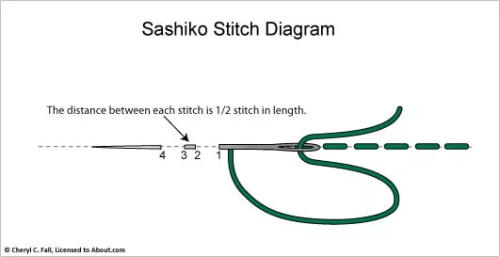
(Image source)
Some resources on sashiko:
SashiCo on YouTube: sashiko livestreams and information on the cultural aspect of sashiko.
Written tutorial by Upcycle Stitches.
Free sashiko templates by TheSpruceCrafts.
Fixing jeans with sashiko by Soluna Collective.

(Image source)

(Image source)
Embroidery:
Regular embroidery is also a popular technique to accentuate your mends. Check out my embroidery 101 post to learn how to get started. You can embroider patches, or use embroidery to hide or accentuate any stitches you’ve made to fix holes. Embroidery’s also a great way to cover up stains.
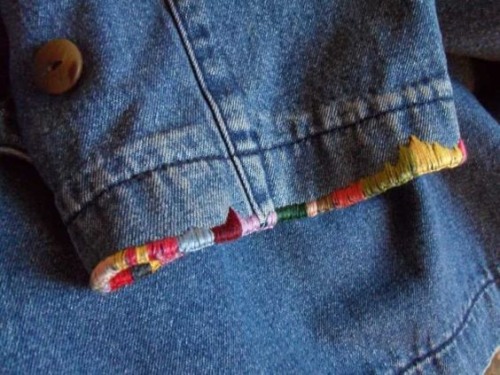
(Image source)
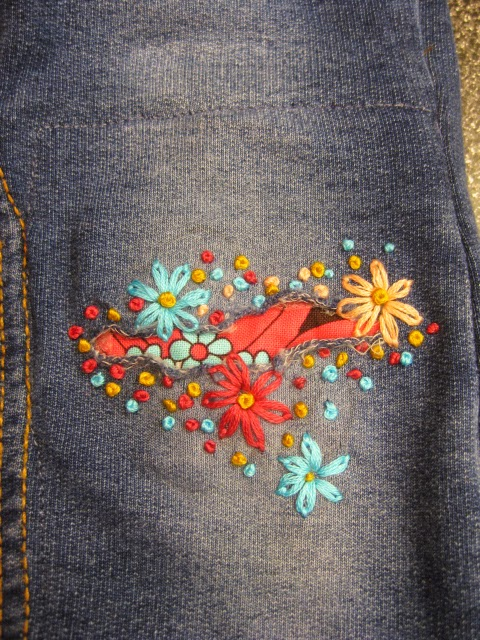
(Image source)
Patches:
There are many ways to add patches to a garment. My tutorial on patches is a good place to start if you want to make custom-shaped patches to sew on top of your fabric. You can also sew your patch on the inside of your garment and have it peek out from beneath the hole you’re trying to fix. Fun ideas for this are lace or superheroes.

(Image source)

(Source)
Darning:
Darning is a technique used to repair holes in fabric by using running stitches to weave extra fabric over the hole as to fill it up again. While traditionally darning is done in an invisible way by using the same colour of thread as your fabric, you can also use contrasting colours to accentuate your fix. Check out this written tutorial on darning by TheSpruceCrafts.
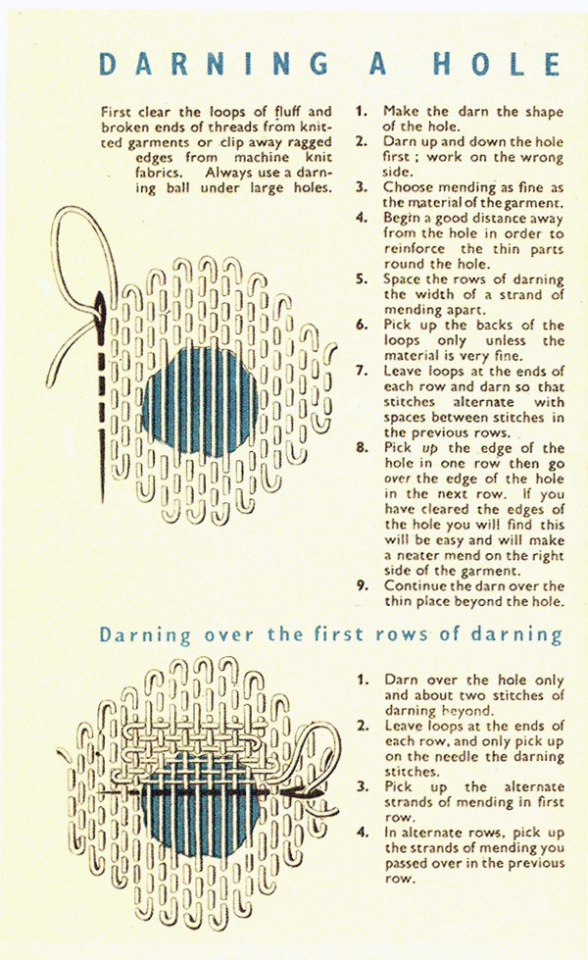
(Image source)
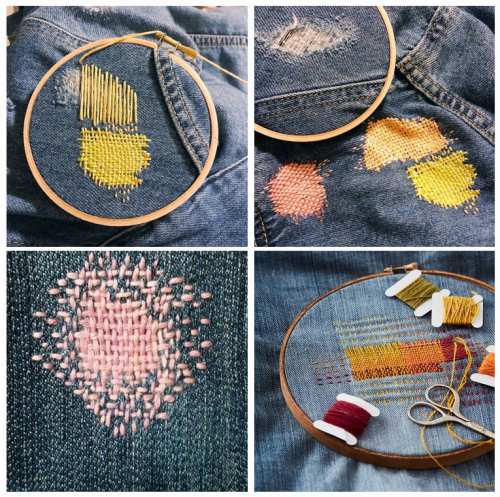
(Image source)
Conclusion:
Visible mending is a creative way to fix up your clothes and give them some personality at the same time.
You should be proud of the fact that you took the time and learned the necessary skills needed to mend your clothes! Show off what you did!
A fun side effect of wearing these obvious mends is that people will notice them. They’ll remember your fixes the next time they’re faced with a hole in their wardrobe, and it will make them more likely to try it for themselves.
These are just a few ways to visibly mend your garments. Want more inspiration? Check out Pinterest or r/Visiblemending on Reddit.
Par contre tant qu’on parle de santé mentale, on marque aussi 1 point pour la distinction entre “déprimé” et “dépressif”, alors qu’en anglais y a juste “depressed”
je sais pas ce que ça dit de nous qu'on a un vocab de la tristesse plus détaillé mais a win is a win

Beaux-arts des modes, no. 3, avril 1925 (New York, Paris, London, Milano, Wien, Bruxelles). Bibliothèque nationale de France
(168.) Three pieces suit in navy blue serge. Loose jacket with side pockets and buttonholes. Skirt lapping over in front. Waistcoat of other shaded crêpe with crossed fronts. Black and white silk braid. Atelier Bachroitz.
Comment je me sens en ce moment:

Image credit to
@poofmalyakaet
Question: what is the best fanfiction you’ve ever read? Can be any fandom and any site. I wanna know which fanfic genuinely changed the trajectory of your life.
(I’m in the middle of writing a proposal to the English department at my uni to let me design a course based around analyzing fanfiction as a legitimate literary genre, and I’d love to hear from everyone!)
101 places to get enthusiastic about linguistics
In honour of Lingthusiasm's 100th episodiversary, we've compiled this list of 101 public-facing places where linguists and linguistics nerds hang out and learn things!
17 podcasts about linguistics
Lingthusiasm — A podcast that's enthusiastic about linguistics!
The Vocal Fries — Language discrimination and how to fight it
The History of English — From Proto-Indo-European to Shakespeare in 180 episodes (and still running!)
A Language I Love Is — Guests (some linguists, some not) talk about languages they love and why
En Clair — Forensic linguistics and literary detection
Because Language — New guests every episode discuss their linguistic interests
The Allusionist — Stories about language and the people who use it
Subtitle — A podcast about languages and the people who speak them
Field Notes — Five seasons on linguistic fieldwork
Tomayto Tomahto — Language meets cog sci, politics, history, law, anthropology, and more
Word of Mouth — A long-running and wide-ranging linguistics program on BBC 4.
Words Unravelled - A new and very well edited etymology podcast with popular creators RobWords and Jess Zafarris
Something Rhymes with Purple — Learn the background behind another word or phrase each episode
Lexitecture — A classic etymology podcast with a huge back catalogue
A Way with Words — A "lively and upbeat" public radio call-in show about language and culture
Språket — A radio program in Swedish answering listener questions about language. We don't speak Swedish, but this was the most-mentioned non-English content in our listener survey!
Living Voices — A podcast in Spanish about endangered languages of the Amazon
12 nonfiction books about linguistics
Because Internet: Understanding the New Rules of Language by Gretchen McCulloch (Amazon; Bookshop) — A linguist shows how the internet is transforming the way we communicate
How Language Works: How Babies Babble, Words Change Meaning and Languages Live or Die (Amazon; Bookshop) by David Crystal — A journey through the different subsystems of language
That's Not What I Meant!: How Conversational Style Makes or Breaks Relationships by Deborah Tannen (Amazon; Bookshop) — A pioneering researcher on conversations gives advice on how they can go wrong
Memory Speaks: On Losing and Reclaiming Language and Self by Julie Sedivy (Amazon; Bookshop) — Scientific and personal reflections on nostalgia, forgetting, and language loss
The Art of Language Invention: From Horse-Lords to Dark Elves to Sand Worms, the Words Behind World-Building by David J Peterson (Amazon; Bookshop) — an accessible guide to making your own conlang
Highly Irregular: Why Tough, Through, and Dough Don't Rhyme—And Other Oddities of the English Language by Arika Okrent (Amazon; Bookshop) — The history behind English's many oddities
Wordslut: A Feminist Guide to Taking Back the English Language by Amanda Montell (Amazon; Bookshop) — A well-researched pushback on sexist language ideology
Word by Word: The Secret Life of Dictionaries by Kory Stamper (Amazon; Bookshop) — A lifelong lexicographer discusses the job and the things she's learned along the way
Lingo: Around Europe in Sixty Languages by Gaston Dorren (Amazon; Bookshop) — A quick, funny tour of the quirks of 60 European languages
Bina: First Nations Languages, Old and New by Felicity Meakins, Gari Tudor-Smith, and Paul Williams (Amazon; Bookshop) — The story of Australian indigenous languages' resistance and survival
Says Who?: A Kinder, Funner Usage Guide for Everyone Who Cares About Words by Anne Curzan (Amazon; Bookshop) — A writers' style and grammar guide focused on real usage, not made-up rules
The Language Lover's Puzzle Book: A World Tour of Languages and Alphabets in 100 Amazing Puzzles by Alex Bellos (Amazon; Bookshop) — Solve puzzles about writing, grammar, and meaning drawn from real and fictional languages
Poems from the Edge of Extinction: An Anthology of Poetry in Endangered Languages (Amazon; Bookshop) — An anthology of poems in endangered languages, with commentary
6 linguistically-inspired novels
Babel: Or the Necessity of Violence: An Arcane History of the Oxford Translators' Revolution by R.F. Kuang (Amazon; Bookshop) — Imagine a world where linguistics was as vital — and as ethically compromised — as engineering is in ours
True Biz by Sara Nović (Amazon; Bookshop) — Love, friendship, and struggle at a residential high school for the Deaf
Ella Minnow Pea: A Novel in Letters by by Mark Dunn (Amazon; Bookshop) — "A progressively lipogrammatic epistolary fable" full of wordplay and weirdness
Semiosis by Sue Burke (Amazon; Bookshop) — Human space colonists communicate with sentient plants
Translation State by Ann Leckie (Amazon; Bookshop) — What does life look like for a perfectly genetically engineered alien–human translator? (Spoiler: weird, that's what.)
Stories of your Life and Others by Ted Chiang (Amazon; Bookshop) — Includes the long short story that became Arrival, plus other reflections on humanity and change
13 linguistics youtube channels
Crash Course Linguistics — A whole linguistics course in 16 videos
Tom Scott's Language Files — Pithy language facts explained quickly and clearly
NativLang — Language reconstruction and the history of writing
Geoff Lindsay — Facts (and some scholarly opinions) about regional English pronunciation
The Ling Space — An educational channel all about linguistics
langfocus — A language factoid channel that digs deeper than many
K Klein — Language quirks, spelling reform, and a little conlanging
biblaridion — Teaching about conlanging and worldbuilding, with lots of linguistics along the way
RobWords — "A channel for lovers and learners of English"
Otherwords — "the fascinating, thought-provoking, and funny stories behind the words and sounds we take for granted"
LingoLizard — Widely spoken languages and their quirks, comparisons, and history
linguriosa — Spanish linguistics (in Spanish), including learning tips and linguistic history
human1011 — Quick accessible facts about linguistics (and sometimes other things)
Simon Roper — Language evolution and historical English pronunciation
10 shortform video channels about linguistics (tiktok/reels)
etymologynerd — Internet speak, etymologies and more! (reels)
linguisticdiscovery — Writing systems, language families, and more (reels)
jesszafaris — Fun facts about words, etymologies, and more (reels)
cmfvoices — An audiobook director talks about the linguistics of voice acting (eels)
mixedlinguist — A linguistics professor comments on the language of place, identity, politics, technology, and more (reels)
landontalks — Linguistic quirks of the US South (reels)
sunnmcheaux — Language and culture from Harvard's first and only professor of Gullah (reels)
dexter.mp4 — Talks about many branches of science, but loves linguistics enough to have a linguisticsy tattoo (reels)
danniesbrain — Linguistics and psychology from a researcher who studies both (reels)
wordsatwork — Quick facts on languages, families, and linguistic concepts (reels)
the_language — The Ojibwe language — plus food, dancing, and more
-
 pratiquecompte reblogged this · 2 months ago
pratiquecompte reblogged this · 2 months ago -
 commanderfreethatdust reblogged this · 1 year ago
commanderfreethatdust reblogged this · 1 year ago -
 commanderfreethatdust liked this · 1 year ago
commanderfreethatdust liked this · 1 year ago -
 rebathetoeless liked this · 1 year ago
rebathetoeless liked this · 1 year ago -
 thisbibliomaniac reblogged this · 1 year ago
thisbibliomaniac reblogged this · 1 year ago -
 losttranslator reblogged this · 1 year ago
losttranslator reblogged this · 1 year ago -
 stealingmyplaceinthesun liked this · 1 year ago
stealingmyplaceinthesun liked this · 1 year ago -
 livingandthriving liked this · 1 year ago
livingandthriving liked this · 1 year ago -
 godsfavoritespecialangel liked this · 1 year ago
godsfavoritespecialangel liked this · 1 year ago -
 richard-hollabackgirl-nixon liked this · 1 year ago
richard-hollabackgirl-nixon liked this · 1 year ago -
 genach liked this · 1 year ago
genach liked this · 1 year ago -
 afterlifeincorporated liked this · 1 year ago
afterlifeincorporated liked this · 1 year ago -
 thisbibliomaniac reblogged this · 1 year ago
thisbibliomaniac reblogged this · 1 year ago

J’utiliserai ce blog pour pratiquer mon français. Toute critique constructive est bienvenue. Désolé.e en avance pour ma grammaire. J’aime le manga, le judo, les sciences physiques, l’histoire, et la mythologie.
161 posts